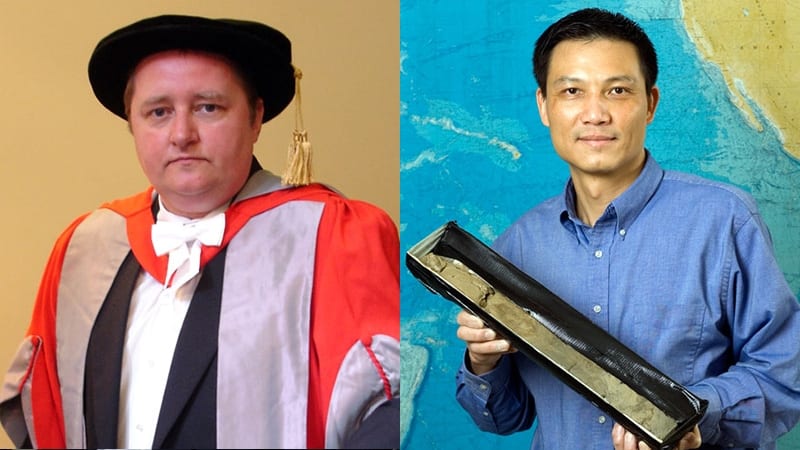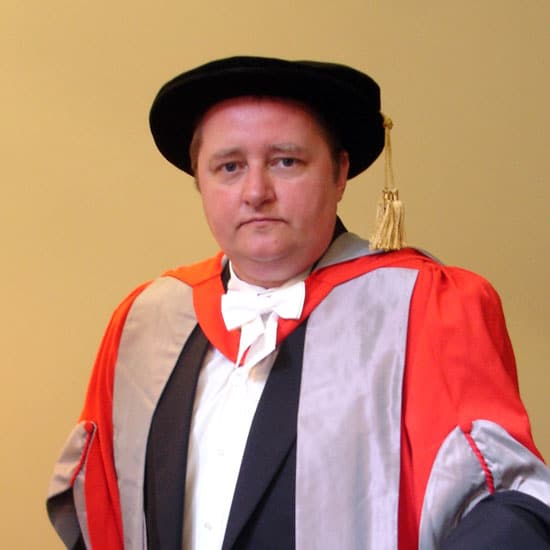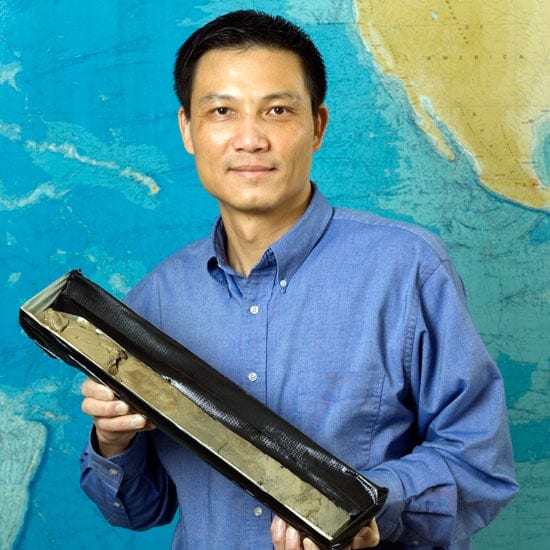WHOI Geologists Recognized for Achievements

May 16, 2007
Two senior scientists in the Department of Geology and Geophysics at the Woods Hole Oceanographic Institution (WHOI) have been honored for their outstanding contributions to understanding the makeup and dynamics of Earth’s ocean floor.
On May 12, marine geochemist Chris German was awarded a Doctor of Science (ScD), or “Higher Doctorate," by the Faculty of Earth Sciences & Geography at the University of Cambridge at a ceremony in England. The granting of a distinguished ScD degree involves a lengthy assessment and approval process, first by an internal assessor, then by two external referees and a degree committee. The process can take as long as three years. The Faculty of Earth Sciences & Geography has only awarded four ScD degrees in the past two years.
Also this week, marine geophysicist Jian Lin was elected a fellow of the Geological Society of America. Lin was honored in recognition of his “innovative, significant, and continuing contributions to the understanding of global ocean ridge processes and earthquake interactions.” Lin will be recognized at the Presidential Address and Awards Ceremony at the annual meeting of the Geological Society of America in Denver, Colo., on October 27, 2007.
It is fitting that German and Lin should be honored in the same week, as the pair collaborate closely on research and serve together as co-chair and chair of InterRidge, an international research program to explore the Mid-Ocean Ridge system. The pair of them recently returned from an expedition to the Indian Ocean where they contributed to the discovery of the first deep-sea hydrothermal vents along the ultraslow-spreading Southwest Indian Ridge.
“Cutting-edge ocean sciences in the 21st century require increasing international cooperation and resources,” said Lin. “We are honored to have an opportunity to lead the international community in promoting and coordinating scientific research and exploration of the fascinating deep-ocean geological, hydrothermal, and biological processes along the global mid-ocean ridges.”
Lin joined the WHOI staff and was a recipient of a Charles E. Culpeper Young Scientist Award in 1988, rising through the institution’s ranks to senior scientist in 2004. He was recognized in 2003 by the Institute for Scientific Information as one of the most-cited authors on earthquake research in the past decade. A paper Lin co-authored with colleagues Geoffrey King (Institut de Physique du Globe, France) and Ross Stein (US Geological Survey, Menlo Park, California) was the most-cited earthquake research article in the 1990s. Their study established basic tenets for the concept that earthquakes can shift stress onto neighboring faults and increase the chances of earthquakes on them.
Lin earned his bachelor’s degree in geophysics from the University of Science and Technology of China in 1982, and his master’s and doctorate in geophysics from Brown University in 1984 and 1988.
German joined the WHOI staff as a senior scientist in 2005 and in January 2006 was named Chief Scientist for Deep Submergence, advising the federally funded National Deep Submergence Facility, which operates a small fleet of deep-sea vehicles ranging from the Alvin submersible to the remotely operated vehicle (ROV) Jason. German earned his bachelor’s degree in geological sciences in 1984, his master’s degree in 1988 and his PhD in marine geochemistry in 1989 - all also from the University of Cambridge. With the award of his ScD from the same institution, he now has the complete set!
“It was a great honor to be recognized in this way,” said German, “and really rather special to be back in Cambridge after so many years, too - especially because two of my closest college friends showed up to mark the occasion. We hadn’t all been in the same place, at the same time, since I finished my PhD -- 18 years ago, to within one day!”
The Woods Hole Oceanographic Institution is a private, independent organization in Falmouth, Mass., dedicated to marine research, engineering, and higher education. Established in 1930 on a recommendation from the National Academy of Sciences, its primary mission is to understand the oceans and their interaction with the Earth as a whole, and to communicate a basic understanding of the ocean's role in the changing global environment.


